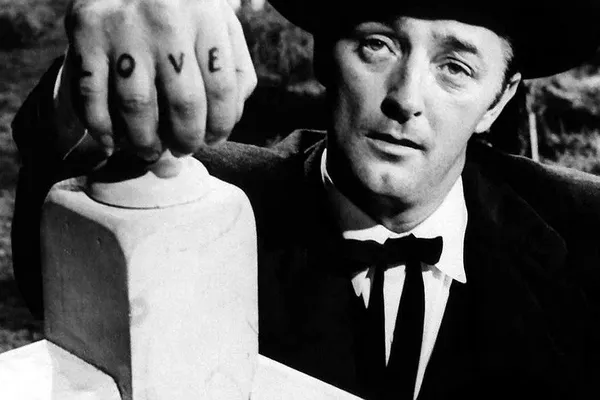Eye For Film >> Movies >> The Night Of The Hunter (1955) Film Review
The Night Of The Hunter
Reviewed by: Robert Munro

More than 60 years after its initial release as a critical and commercial flop, The Night of the Hunter remains a brilliant oddity without equal. It is no more a film than a dark nightmare in which seemingly disparate and unworkable elements come together to create one of cinema’s most unsettling visions.
Charles Laughton, the acclaimed English actor, directed it from a screenplay written by James Agee – one of America’s greatest early film writers – which in turn adapted Davis Grubb’s novel of the same name. Throw into the mix cinematographer Stanley Cortez (frequent collaborator with Orson Welles and Samuel Fueller) and the strong central cast of Robert Mitchum, Shelley Winters and Lillian Gish, and you’ve got a bunch of fantastic ingredients beautifully managed and brought to fruition by Laughton’s direction.

It is Lillian Gish – one of silent-era Hollywood’s biggest stars – who opens the film appearing as a ghostly apparition in the black night sky. She begins in a ‘once-upon-a-time’ manner, telling a similarly disturbing assortment of phantom-like faces – the children she looks after – to “Beware of false prophets that come to you in sheep’s clothing.” Dissolve to Mitchum in a role which seemed written for him. He’s dressed as a Preacher, conversing with a Lord of his own invention: “What’s it to be Lord? Another widow? Is that six... maybe more like 12?”
Mitchum’s Preacher character – Harry Powell – is one of the most repulsive yet alluring villains ever portrayed on the big screen. Those odd angles that make up Mitchum’s face seem to play tricks in the haunting expressionist black and white design of the film. His every gesture and movement invokes a creeping dread completely at odds with that deep sonorous voice of his and the words of ‘the Lord’ which tumble from him.
‘Reverend’ Harry Powell is spending some time in the big house after a conviction for car theft. He shares a cell – somewhat improbably, but never mind – with the soon to be executed Ben Harper, convicted of robbery and murder. In his sleep Harper murmurs about the $10,000 he managed to hide from the authorities before his capture. Powell manages to find out that Ben has a wife and two kids back home, but doesn’t manage to wring a confession about where the money’s hid. A widow, ten thousand bucks and two helpless children? Right down Powell’s street.
His arrival outside the children’s window as brother and sister – John and Pearl – discuss the hidden money begins the nightmare for the children, and is an introduction (of sorts) almost as worthy as Orson Welles’ famous first appearance as Harry Lime in The Third Man. The shadow of Powell sneaks across the bedroom of the children, engulfing young John. He looks out the window to see Mitchum standing in front of a lamp-post, his dulcet tones, sweetly singing the hymn ‘Leaning on the Everlasting Arms’ which will recur throughout the film as sort-of battle cry for the psychotic Preacher. The hunt has begun.
Mitchum is well supported by Winters as the hysterical widow, desperate for redemption. Her attempts to seduce Powell on their wedding night give us our first real glimpse of the violence which Powell is capable of and his overwhelming hatred of women and the vices of the flesh. Alongside Winters there are engaging, and humorous, performances from a supporting cast of character actors: Evelyn Varden as the meddling do-gooder Icey Spoon (great name) and James Gleason as the old drunk Birdie Steptoe, who is a friend to young John Harper in the absence of a father, both offer some laughs beneath the pervading gloom.
The children flee the persistent Preacher after he’s done away with their mother – the shots of her drowned in her car in the river have a dreamy Gothic beauty and are amongst the film’s best – and travel through the Depression-era Mid West seeking refuge. They find it in the form of Miss Cooper – Lillian Gish - who plays a generous carer for forgotten children, guided by her genuine Christian faith.
Powell tracks them down but is met with the belligerence of Miss Cooper in her love for the children. Powell haunts their house from outside, in the shadows – his soft whisperings of ‘Leaning...’ carried by the breeze inside. Cooper, rocking on her chair in the dark house, cradles a rifle across her lap and joins in with the Preacher, the two briefly in harmony despite their opposite interpretations of the teachings of the Lord.
All in all, it’s a wild ride. It is religious allegory, horror, fairytale, nightmare, comedy and film noir all at the same time. It features Mitchum cut loose, yet clearly impassioned by the material. It’s sentimental, yet deeply troubling and with the bleakest of souls. It’s also darkly funny, and at times contrived and about as subtle as a sledgehammer to the face (Mitchum’s arrival into the widow’s town screams with b-movie pulp in the most delightful way).
Through all of this it is shot in the most striking and haunting black and white photography, meticulously designed in the manner of the terror invoked by the German expressionists of the silent era, with their abstract lighting and angular set design. It’s such a tragedy that Laughton only directed this one feature, and that it was met with a distinctly cool reception back in the day. Then again, how would he have topped it?
Reviewed on: 21 Jun 2013

















